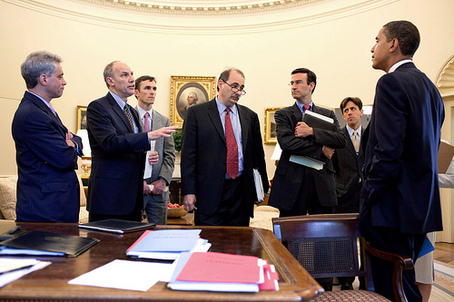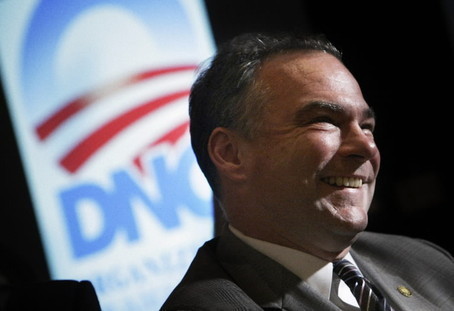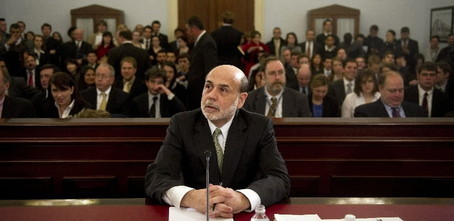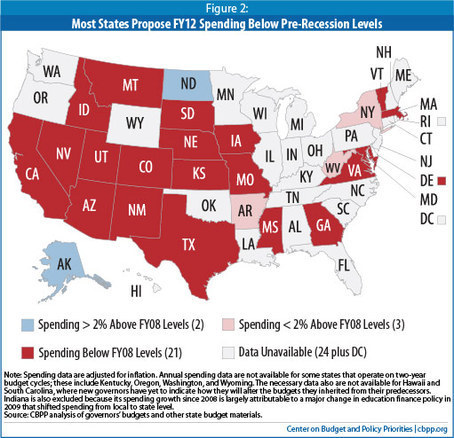Ezra Klein's Blog, page 903
February 9, 2011
Reporters aren't the only ones who like to gossip
This is a very good post by Brad DeLong on the substance of the debates between Peter Orszag and others in the Obama administration. I'm a bit more sympathetic to Orszag's position than Brad is, primarily because I think the administration essentially allowed the Republicans to define "deficit reduction " as "spending cuts," and that's going to have some bad consequences over the next few years. But you should read it rather than having me summarize it.
But I'd add one caveat to DeLong's complaint that much of the reporting on the administration's internal disputes "reads like Hollywood celebrity journalism: 95 percent gossip, and perhaps 5 percent policy." There's a tendency to blame reporters for the stories they tell, and I'm not arguing with it. Ultimate responsibility lies with us. And for my part, I stay away from doing tick-tocks of meetings and arguments unless I think there are serious implications for policy. But these sorts of gossipy, "so-and-so did such-and-such at this-or-that meeting" stories are often an honest reflection of what you get when you talk to the people who were in the meetings. Sometimes, it's actually difficult to get to the meat of the dispute because people are so much more interested in how the dispute was handled.
I guess that's natural. The people working in politics are human and they're ticked off by how they were treated, or by the way their boss spoke about them, or by something they heard someone else said about them, or by a meeting they weren't called into. Think about your job, which probably involves issues that are more important than office politics. Now think about how often you complain to your friends or spouse about office politics. It happens in the White House and Congress, too. That's not to say reporters don't spend too much time on it, or that they shouldn't toss a lot of that stuff out and tell the story lurking behind the anecdotes. But before coming to DC, I operated from the mental model that political actors were always begging reporters to cover the substance and reporters were always ignoring them and covering quarrels. To a degree I find disappointing, that's not really true.
I guess the more positive spin on all this is that it's important for administrations to be well managed and thus these stories actually do get at something important, which is that management has broken down and the White House is functioning poorly. That probably does have consequences for policy, though I think the consequences are often overstated by the people involved. If the administration's economic policy process had been 30 percent more collegial and professional, would our economic policy be any different today? I'm skeptical.
Photo credit: White House.




PPACA? Seriously?
I don't care if people refer to the Patient Protection and Affordable Care Act as ObamaCare or health-care reform or the ACA or the BaucusBill or anything else. This is the sort of thing that keeps political professionals busy, but doesn't much matter to people. The law is unpopular right now because people have a bad impression of it, not because the title didn't go through enough focus groups. Nevertheless, Kevin Drum is right about this:
The real problem here is that Democrats, once again, failed Legislation 101. This was their bill. They could name it anything they wanted. So what did they choose? PPACA. That's very memorable, isn't it? What's wrong with these guys?
Perhaps Slate, fresh off the success of the Obama slogan generator, could create an app to name bills.




Does not dessert by any other name still taste as sweet?
I liked this exchange between the New Yorker's Adam Gopnik and El Bulli's Ferran Adria on where dessert is going:
Were we, I asked, on the verge of entirely breaking down the line between sweet and savory?
He looked at me with delighted triumph. "It can't be that an American is asking me that!" he said. "A hamburger with ketchup and Coca-Cola? That's the most intense symbiosis of sweet and savory imaginable. It's your cultural theme."
Good point! If someone served me ice cream in the middle of a meal, I'd be rather surprised. But hand me a Coke, which is, if anything, sweeter, and I don't even blink.
Photo credit: Joshua Lott/Reuters.




Tim Kaine for Senate?
James Webb will not run for reelection in 2010. That means, I'd think, that some members of the Obama administration had better be on the phone telling Tim Kaine to get in the race. Kaine is a former governor of Virginia, and by all accounts, popular in the state. If anyone can hold Virginia's second Senate seat for the Democrats, he can.
But the White House hasn't always taken the recruitment of challengers that seriously. In 2008, they brought Iowa's Tom Vilsack, Arizona's Janet Napolitano, Kansas's Kathleen Sebelius, and Colorado's Ken Salazar into the administration. The payoff? They almost lost Salazar's Senate seat and Democrats had to find weaker candidates in Iowa, Arizona, and Kansas. It stands, to me, as the administration's single most baffling set of political decisions. There were plenty of other people capable of running the various cabinet agencies. There were no other people capable of replacing the threat Vilsack would have posed to Chuck Grassley or that Napolitano would've posed to John McCain, and thus no one who could've done as much to convince them that cooperating a bit on initiatives like health-care reform would be in their interest. Similarly, Sebelius was the only Democrat in Kansas who even had a chance of winning the state's open Senate seat. Why pull her to Washington in a different capacity?
Even now, Sebelius and Napolitano and Vilsack and Salazar have to spend a lot of time figuring out how to guide the administration's agenda through the Senate. The irony is they would've been much more effective in that capacity from the outside. Similarly, Kaine is reported to be very close with the president. Obama even elevated him to chairman of the Democratic National Committee. But it's pretty clear now where Kaine could do the most to help the White House, and it's not in another appointed position.
AP Photo/Haraz N. Ghanbari.




Featured Advertiser
Lunch Break
A debate of "The Spirit Level," a book that marshals an impressive amount of data to suggest that high levels of inequality do enormous damage to the social structure of countries.




Bernanke tries to reassure the GOP
Federal Reserve Chairman Ben Bernanke is testifying for the first time before Rep. Paul Ryan's Budget Committee today, and his prepared remarks are worth a read. Message? Nothing much to see here.
Inflation is low, employment is depressed, and the economy is growing but not fast enough, Bernanke says. Therefore, the Fed has to act. But he's careful to try to argue that the Fed's latest actions, which haven't been particularly popular among Republicans in general and Ryan in particular, are less unconventional than many in the party have suggested. "Although large-scale purchases of longer-term securities are a different monetary policy tool than the more familiar approach of targeting the federal funds rate," Bernanke argues, "the two types of policies affect the economy in similar ways."
In other words, if you believe in the Fed's normal activities -- and most in Congress say they do -- quantitative easing shouldn't scare you. Nor should you think the Fed is running off in a new direction, with new priorities. "We remain unwaveringly committed to price stability," Bernanke promises, "and we are confident that we have the tools to be able to smoothly and effectively exit from the current highly accommodative policy stance at the appropriate time." Bernanke's hope is that he can persuade Republicans who've grown skeptical of the Fed over the past two years that there's no difference between the Fed now and the Fed when Alan Greenspan was in charge.
Of course, some in Congress didn't like the Fed even back when Greenspan was helming it. In particular, Rep. Ron Paul, who is chairing his first hearing today as head of the committee that oversees monetary policy -- which is to say, the committee that oversees the Fed. Paul, of course, recently published a book titled "End the Fed," so he's not exactly a friendly face. And eventually, Bernanke is going to have to head over to his hearing room. That's when the sparks will really fly.
Photo credit: Jim Watson/AFP/Getty Images.




Do Hoosiers have worse dentists than Californians?
I doubt it. And so does Adam Ozimek:
State by state variation also provides a useful rebuttal to occupational licensing defenses that appeal to our desire to have quality services. Do you really think of Indiana as a laissez-faire, low quality free-for-all where you can't tell whether your dentist is illiterate and your heart surgeon is a legally blind imbecile who works a night shift at White Castle? No, you don't, and it's likely that if California adopted the much lower licensing regulations of Indiana they wouldn't become one either.
In some cases, we even have a bit of a data on how the highly regulated states compare to the loosely regulated states:
Alabama has perhaps the strictest licensing requirements in the nation: 750 hours of schooling and a written and practical exam. The state gets, on average, four public complaints a year about poor service, according to the Alabama Board of Cosmetology.
Connecticut, which doesn't require manicurists to get licenses, has averaged just six complaints a year to the state over the past five years. Two-thirds of those complaints are about gift certificates that aren't honored, according to data from the consumer protection division of the state attorney general's office.
And the case for the defense?
In Kentucky, the Board of Hairdressers and Cosmetologists has eight full-time inspectors who spend much of their time responding to anonymous tips about unlicensed manicurists. The inspectors rarely catch the alleged offenders, says Charles Lykins, the board's administrator, because "they take off running."
Mr. Lykins says it's in the public's interest to insist manicurists are well-trained. "Have you ever had a nail fungus? It's terrible," he says. "That's why we're there."
This sort of thing should particularly offend liberals, I think, as bad regulations undermine good regulations.




How much more should the states cut?
Over the next few days, the Obama administration is going to propose some financial help for the states. Congressional Republicans, who've adopted a tough-love attitude to the states that found their fiscal position rocked after Congress and federal regulators neglected to notice that Wall Street had gone totally berserk, are not happy about it. They want to see the states dig out of their holes by cutting spending further. But how much further?
Nearly all states are proposing to spend less money than they spent in 2008 (after inflation), even though the cost of providing services will be higher. Most state spending goes toward education and health care, and in the 2012 budget year, there will be more children in public schools, more students enrolled in public colleges and universities, and more Medicaid enrollees in 2012 than there were in 2008. But among 26 states which have released the necessary data, 21 states plan to spend less in 2012, after inflation, than they did in 2008, and only two — Alaska and North Dakota — expect to spend significantly more. Total proposed spending would be over 10 percent below 2008 inflation-adjusted levels.
That's from the Center on Budget and Policy Priorities' latest analysis of state fiscal plans. And that second sentence is an important one: When you say states should cut spending dramatically, you're saying they should cut funding for education and health-care services dramatically. And they -- or at least 22 of the 31 states that have released their plans for 2012 -- are:
-At least 13 states have proposed deep cuts in pre-kindergarten and/or K-12 spending. The governor of Mississippi proposes education spending that fails for the fourth year in a row to meet statutory requirements enacted to ensure adequate funding in all school districts. (The three previous years of underfunding have cost over 2,000 school employees their jobs.) The Texas budget proposal would eliminate pre-K funding for nearly 100,000 mostly at-risk children — over 40 percent of the state's pre-kindergarten students.
-At least 15 states have proposed deep cuts in health care. In Arizona, the governor's budget would cut health care for 280,000 poor individuals. Washington's governor proposes eliminating affordable health care for more than 60,000 low-income residents.
-At least 11 states have proposed major cuts in higher education. Arizona would cut state support for public universities by one-fifth; when combined with previous cuts, this would reduce per-student state funding 46 percent below pre-recession levels. California's governor proposes to reduce funding for the state's two university systems by $1 billion. For one of those two systems, the University of California system, the cuts would bring spending down to the fiscal year 1999 level — when the system had 31 percent fewer students than it does today.
It bears repeating that one of the most dangerous things an economic downturn can do is reduce your potential for long-term economic growth. Deep cuts in education funding that lead to fewer kids getting quality pre-k and fewer students attending college are one mechanism through which that can happen.




AOL HuffPo AIL HufPo Huffintgon AOK
Farhad Manjoo's got the lede of the week:
Are you wondering, "will AOL's acquisition of the Huffington Post be successful?" I bet you are, as that's been a common search engine query since the announcement earlier this week that AOL will buy the Huffington Post. Other ways you might phrase the question include, "AOL Huffington Post will work?" or "AOL and Arianna good idea?" But some people can't spell, so it's likely that a few are searching for things like, "AOL do I need dial-up to read HyffPo now?" or "Ariana Hiffington evil genius or just evil?" Well, any way you search for it, you're in luck, because you've arrived at the best page on the Web to tell you all you need to know about AOL acquiring the Huffington Post—or should I say, AOL acquiring HuffPo. Or, that is to say, AOL buying HuffPo. (HuffPo being the short name for Arianna Huffington's site, the Huffington Post, which has just been bought by AOL.)
Before I go on, let me stop and say a couple of more important things: Aol, Aol Acquires Huffington Post, Aol Buys Huffington Post, Aol Buys Huffpo, Aol Huffington Post, Huffington Post, Huffington Post Aol, Huffington Post Aol Merger, Huffington Post Media Group, Huffington Post Sold, Huffpo Aol, Huffpost Aol, Media News.
See what I did there?
Do you see what he did there? If not, click over. Anyone who spends a lot of time looking for news on the Internet should understand it.




Ezra Klein's Blog
- Ezra Klein's profile
- 1105 followers









